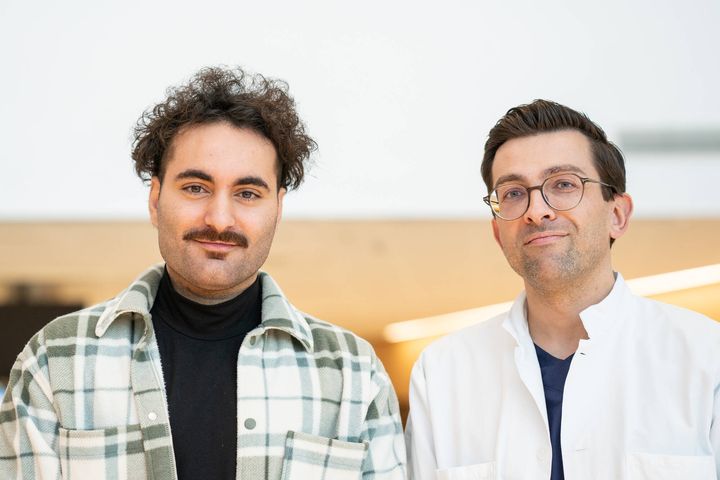Psychological stress significantly increases the risk of stroke in young women without known predisposing factors
Increased psychological stress significantly raises the risk of stroke in young women who do not have known predisposing factors for stroke. This increase in risk was not observed in men, according to a large international study led by HUS Helsinki University Hospital.

Studies have shown that strokes in individuals under 50 have become more common, partly for unknown reasons. Up to 50% of young stroke patients do not have a specific cause for stroke, making these cases so-called cryptogenic strokes.
The SECRETO study included 426 individuals under 50 who had recently experienced a cryptogenic stroke and 426 age-matched control subjects. Participants were recruited from 19 hospitals across Europe. The study collected extensive data on participants' previous medical conditions, lifestyles, and family backgrounds.
Continuous stress as a risk factor for stroke in young women
The SECRETO study is the largest international study to demonstrate that increased psychological stress, especially when it persists at least at a moderate level, significantly increases the risk of stroke, particularly in young women (aged 18-49) whose stroke cause remains otherwise unknown.
Stress was measured using an internationally accredited questionnaire. Patients were asked to assess their stress levels in various aspects of their lives during the month before their stroke. The same questionnaire was administered to the control subjects.
Psychological stress is a modifiable risk factor through lifestyle changes.
"The difference between young women and men may possibly be explained by the fact that young women have to balance different aspects of life more than men, which increases stress levels," says the first author of the article, doctoral researcher Shakar Kutal.
A stroke at a young age can affect the patient's ability to study and work, family life, and functionality for decades. Therefore, it is essential to further investigate the mechanisms between stress and stroke risk, the researchers emphasize. Measures aimed at preventing strokes and advancing research are crucial for society.
The study results have been published in the journal Neurology. The study is part of the international SECRETO multicenter study (Searching for Explanations for Cryptogenic Stroke in the Young: Revealing the Etiology, Triggers, and Outcome), led by HUS Neurology, which investigates the causes and background factors of cryptogenic strokes in young people.
The research article: Association between self-perceived stress and cryptogenic ischemic stroke in young adults: a case-control study. The study was published online in the journal Neurology on March 5, 2025.
In university hospitals, research is part of the treatment: we continue to evaluate and develop our treatments based on research knowledge and patient experience. HUS and the Faculty of Medicine at the University of Helsinki are close partners in science. We publish approximately 2,400 peer-reviewed research articles annually, which we highlight in our news.
The HUS media service is available for the media Mon–Thu 10:00 a.m.–4:00 p.m. and Fri 10:00 a.m.–3:00 p.m., tel. 050 427 2875, or via e-mail: viestinta@hus.fi.
Keywords
Contacts
Nicolas Martinez-MajanderAssociate Professor, NeurologistHUS, Neurocenter
nicolas.martinez-majander@hus.fiJukka PutaalaAssociate Professor, Chief Physician, director of SECRETO multicenter studyHUS, Neurocenter
jukka.putaala@hus.fiAbout HUS
HUS Helsinki University Hospital is the biggest provider of specialized healthcare in Finland. Our high expertise is internationally recognized and accredited. As a university hospital, we are on the cutting edge of developing and evaluating our treatment methods and activities.
HUS treats almost 700,000 patients every year. Our more than 27,000 professionals work to provide the best possible care for our patients. We are responsible for organizing specialized health care in the Uusimaa region. The treatment of many rare and difficult diseases in Finland has been centralized to HUS as well.
HUS – Leading healthcare
The HUS media service is available for the media Mon–Thu 10:00 a.m.–4:00 p.m. and Fri 10:00 a.m.–3:00 p.m., tel. 050 427 2875, or via e-mail: viestinta@hus.fi.
hus.fi/en
Alternative languages
Subscribe to releases from HUS
Subscribe to all the latest releases from HUS by registering your e-mail address below. You can unsubscribe at any time.
Latest releases from HUS
HPV-test är effektivare och lika säkert som gynekologiskt cellprov vid screening för livmoderhalscancer15.12.2025 14:14:42 EET | Pressmeddelande
Förstadieförändringar upptäcks bättre vid HPV-screening än vid screening med gynekologiskt cellprov (papa). Det är viktigt att delta i screeningen när man får en kallelse.
HPV-testi on tehokkaampi ja yhtä turvallinen kuin papakoe kohdunkaulan syövän seulonnassa15.12.2025 14:14:42 EET | Tiedote
HPV-seulonta löytää esiastemuutokset papaseulontaa herkemmin. Seulontaan kannattaa osallistua, kun siihen saa kutsun.
HPV test is more effective and as safe as Pap smear in cervical cancer screening15.12.2025 14:14:42 EET | Press release
HPV screening is more sensitive in detecting precancerous changes than Pap screening. It is advisable to participate in the screening when the invitation comes.
HUS ser ut att lyckas balansera ekonomin och täcka underskotten före slutet av 202515.12.2025 12:32:47 EET | Pressmeddelande
HUS-sammanslutningens styrelse behandlade på sitt möte den 15 december den sista årsprognosen för 2025. Enligt den lyckas HUS som första aktör inom social- och hälsovården balansera sin ekonomi och täcka sitt underskott på det sätt och inom den tidtabell som krävs enligt lag.
HUS-yhtymä näyttää onnistuvan talouden tasapainottamisessa ja alijäämien kattamisessa vuoden 2025 loppuun mennessä15.12.2025 12:21:57 EET | Tiedote
HUSin yhtymähallitus käsitteli 15.12. kokouksessaan vuoden 2025 viimeistä vuosiennustetta, jonka mukaan HUS-yhtymä pystyy ensimmäisenä julkisena sote-toimijana tasapainottamaan taloutensa ja kattamaan alijäämänsä lain edellyttämällä tavalla ja aikataulussa.
In our pressroom you can read all our latest releases, find our press contacts, images, documents and other relevant information about us.
Visit our pressroom